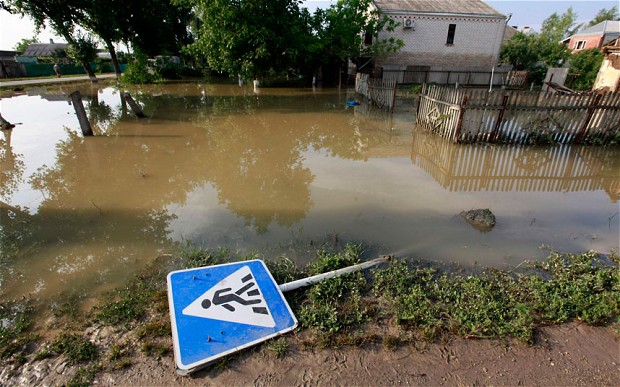
Putin’s Counter-Reform Props up His Dysfunctional Regime by Amplifying Uncertainty
Publication: Eurasia Daily Monitor Volume: 9 Issue: 134
By:

The main news in Russia last week was the tragedy of the flash flood in Krymsk, much the same way as a year ago it was the sinking of the cruise ship “Bulgaria.” Two years ago, devastating wildfires in central Russia dominated the summer news cycle. And three years ago, it was the collapse of the Sayano-Shushenskaya hydropower station. More than any of the previous summer disasters, the devastation in Krymsk has proven the weakness of the Russian state, which is dominated by bureaucracy and infected by corruption (Nezavisimaya Gazeta, July 11). Bloggers have provided the most convincing explanation for the seven-meter-high flash flooding, which hit the Northwest Caucasus, while the authorities were busy explaining away their helplessness; and volunteers have provided the most effective support for the victims, while official promises of compensation have been slow to materialize (BestToday, Gazeta.ru, July 12). The collective mistrust in the authorities, which was revealed rather than caused by this tragedy, is so profound that it is hard to rationalize the readiness of the deeply discontented residents of Krasnodar Krai to vote for President Vladimir Putin and go along with the rotten regional administration (Moskovskie Novosti, July 13).
Putin was not able to perform one of his favorite PR tricks – “manual management” of this disaster – and did not even make a scapegoat out of the notorious Krasnodar Krai governor Aleksandr Tkachev, who is a big shareholder in the Sochi construction projects crucial for the 2014 Winter Olympics and has many influential friends in Moscow (Novaya Gazeta, July 13). Putin’s prime concern is preventing the “white opposition” from gaining extra support due to the Krymsk tragedy, so his efforts are focused on discrediting its leaders and activities by investigating the “riots” of June 6, publishing the private correspondence of increasingly popular Aleksei Navalny, and keeping behind bars the young women from the punk group Pussy Riot (Nezavisimaya Gazeta, July 13). Particular emphasis in these efforts is placed on the package of new legislation rushed through the State Duma in a matter of a few weeks that regulates every avenue of opposition offensive, from street rallies to freedom of expression, and from censoring the Internet to compromising the NGOs receiving Western grants (Vedomosti, July 13).
Each of these laws is justified by references to European and US legislation, such as the Foreign Agents Registration Act (FARA), which is grossly misleading; and the space for abuse is wide open in Russian courts where judicial independence remains a foreign concept (Polit.ru, July 14). Taken together, they signify a reversal of Medvedev’s feeble attempts at political liberalization and a fallback to the vintage Putinism based on monopolization of power. It is doubtful that Putin is familiar with Alexis de Tocqueville’s warning that the most dangerous moment for a bad government is when it begins to reform; but nonetheless, the President’s political instinct recognizes a cause for alarm (Moscow Echo, July 13). It matters little that experts theorize economic reforms can only progress if the political sphere opens up for more competition; for Putin, political control comes first, and he tends to believe that nothing is wrong with the model of bureaucratic capitalism where huge state corporations are run by his loyalists and cronies. His counter-reforms, however, are irresolute and sluggish.
Putin is not really keen to unleash repressions, knowing that a large part of the bureaucratic elite – worried about its fortunes safely deposited in the West and scared by the progress of the “Magnitsky bill” in the US Congress – could defect from him (PBC Daily, July 13). The strategy he excels at is building up uncertainty so that every potential “white ribbon” would know there is no safety in the numbers that the street protests have achieved so far. At the same time, the Putin regime dispenses no brutal suppression or collective punishment that could enrage many among the discontented, thus swelling the rallies. Uncertainty is also used for disciplining the elites. Some regional clans, for instance in Kabardino-Balkaria, are prosecuted for corruption, and some “power structures,” for instance the top level of the Interior Ministry, are thoroughly reshuffled, while the majority of bureaucrats feels reasonably safe (Lenta.ru, July 14; Moskovskie Novosti, June 18).
In order to bolster the domestic role of the master of uncertainty, Putin seeks to reassert his international credentials, but has unexpectedly encountered a chain of setbacks and fiascos. His first visit to Europe was embarrassingly disagreeable; the restoration of amicability with Belarusian President Alyaksandr Lukashenka has tainted him by association with the ostracized dictator; and soon after his friendly visit to Tashkent, President Islam Karimov shrewdly suspended Uzbekistan’s participation in the Collective Security Treaty Organization (Nezavisimaya Gazeta, July 4). Russia’s contrarian position on the civil war in Syria, instead of boosting its profile in the Middle East, has made Putin look scared of the specter of revolution (Gazeta.ru, July 12). Moscow currently has a rare position of strength vis-à-vis Ukraine, where economic and political crises come together while the EU has turned its back on Kiev’s plight. But the long-expected meeting between Putin and President Viktor Yanukovich last week was a major disappointment. It lasted barely 20 minutes, and Putin’s rendezvous with a group of bikers on the way to the Livadia palace received more coverage than his lukewarm consent to delimit the maritime border in the Kerch Strait (Kommersant, July 13).
These foreign policy setbacks reflect the fact that degrading Putin’s domestic standing is narrowing the limits of his overall power and authority (Vedomosti, July 11). The bureaucracy does not appreciate his use of uncertainty to manipulate the domestic situation and would rather prefer him as the figurehead who secures popular support. In order to cut a convincing figure, however, Putin needs to score a clear victory over the opposition and not merely facilitate its dissolution. Moscow is set to see a decisive confrontation in the autumn as the opposition gathers its forces in order to defy the selective “tightening of screws.” Meanwhile the elites, who are heavily concentrated in the capital, will evaluate the effectiveness of Putin’s counter-reforms and contemplate their other choices besides following the dull drum of a dictatorship on the defensive. “Back to basics” is not a solution for Putin’s Moscow problem, and the hard-driven, dynamic megalopolis is beginning to see no future with him.




